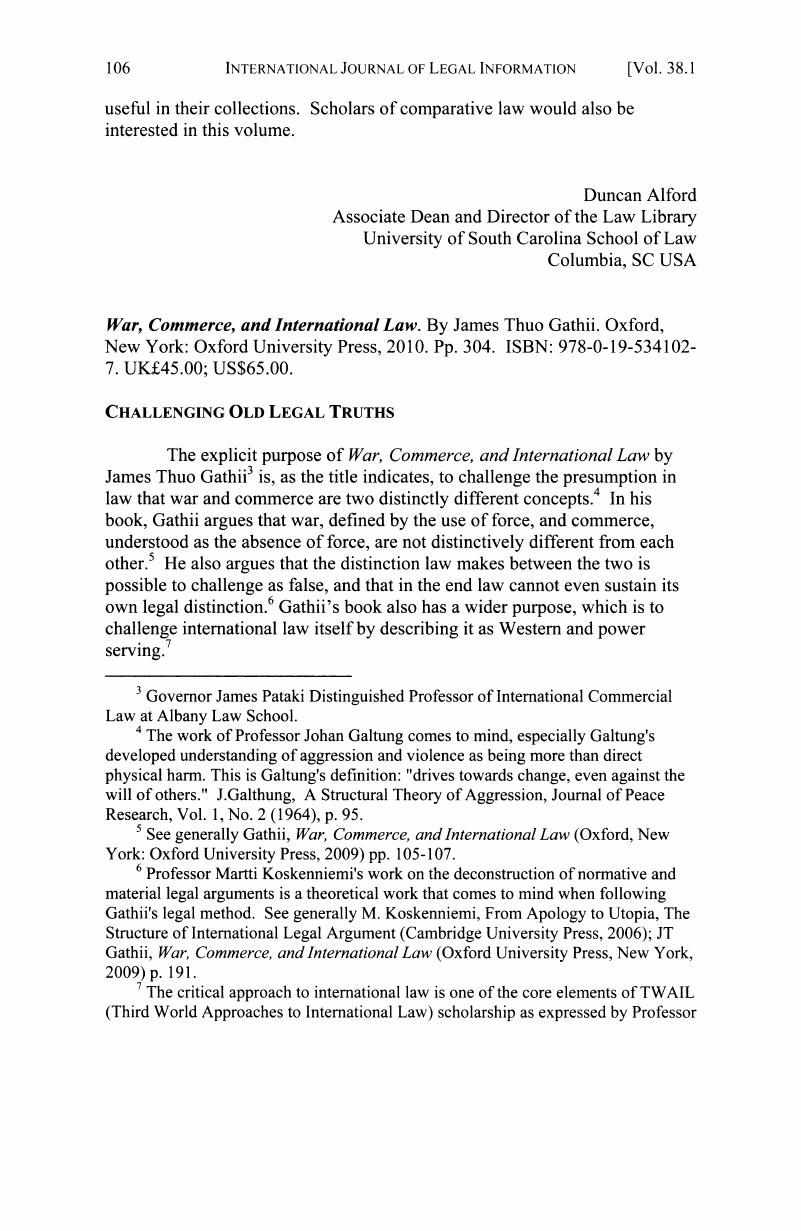No CrossRef data available.
Published online by Cambridge University Press: 28 February 2019

3 Governor James Pataki Distinguished Professor of International Commercial Law at Albany Law School.Google Scholar
4 The work of Professor Johan Galtung comes to mind, especially Galtung's developed understanding of aggression and violence as being more than direct physical harm. This is Galtung's definition: “drives towards change, even against the will of others.” J.Galthung, A Structural Theory of Aggression, Journal of Peace Research, Vol. 1, No. 2 (1964), p. 95.Google Scholar
5 See generally Gathii, War, Commerce, and International Law (Oxford, New York: Oxford University Press, 2009) pp. 105–107.Google Scholar
6 Professor Martti Koskenniemi's work on the deconstruction of normative and material legal arguments is a theoretical work that comes to mind when following Gathii's legal method. See generally M. Koskenniemi, From Apology to Utopia, The Structure of International Legal Argument (Cambridge University Press, 2006); JT Gathii, War, Commerce, and International Law (Oxford University Press, New York, 2009) p. 191.Google Scholar
7 The critical approach to international law is one of the core elements of TWAIL (Third World Approaches to International Law) scholarship as expressed by Professor Makau Mutua: “The regime of international law is illegitime.” see Mututa, Makau What is TWAIL? 94 Am. Soc'y Int'l L. Proc. 31 (2000), p. 31; See generally Gathii's chapter on “Hegemonic Erosion of a Customary International Law Canon over Non-European ‘Property'.” Gathii, pp. 58–70.CrossRefGoogle Scholar
8 Anghie, Antonyand Chimni, B.S. describe how TWAIL has gone through two stages TWAIL I & TWAIL II, where the focus has moved from a focus on colonialism to post-colonialism. Anghie, A. & Chimni, B.S., Third World Approaches to International Law and Individual Responsibility in International Conflicts, 2 Chinese J. Int'l L. 77 (2003). Gathii, pp. 211–219.Google Scholar
9 Id. pp. 58–70.Google Scholar
10 Id. pp. 46, 93.Google Scholar
11 Id. pp. 220–222, 223–225.Google Scholar
12 Gathii argues that contrary to the general view that private armies are quite unregulated in international law, there are regulations in for example The Organization of African Unity's Convention for the Elimination of Mercenaries in Africa, O.A.U. Doc. CM/433/ Rev. L. Annex I (1972).Gathii, p. 231.Google Scholar
13 Mostly expressed in post-colonial literary studies, see generally Bahbha, Homi K.and Spivak, Gayatri Chakraorty Google Scholar